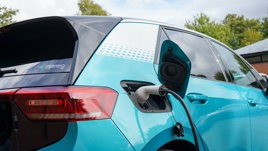Jordan Brompton, co-founder and chief marketing officer of myenergi, explains why supply chain challenges are holding the UK back in the transition to electrification, as well as the subsequent impact this has on dealer sales struggles.
The UK remains a proud talisman in the global race to electrification. While we may not be able to compete directly with far larger economies on scale alone (China, for example, dwarfs both our EV unit sales and financial investment into battery production by an extraordinary margin), Britain certainly punches well above its weight when it comes to innovation and legislation.
The upcoming 2030 ban on the sale of new petrol and diesel cars is obviously an important talking point, as is continued financial incentivisation offered from a government level for EV adoption, but the UK is far from a one trick pony. Indeed, its continued leadership in electrification remains multi-faceted.
Insight from the SMMT, for example, reveals that the UK’s investment in EV production, research and development has surpassed £10.8bn since 2011 – a period that many refer to as the ‘electric decade’. What’s more, while manufacturing volumes now pale in significance compared to the wider global output, it’s important to mention that Nissan’s Sunderland plant was responsible for producing more than 20% of all EVs sold in Europe back in 2016.
 Elsewhere, the UK has set the standards when it comes to technology, innovation and engineering excellence.
Elsewhere, the UK has set the standards when it comes to technology, innovation and engineering excellence.
From developing first-to-market charging solutions and intricate technologies for the alternatively-fuelled vehicles of tomorrow, to providing innovation and development bases for several overseas OEMs (including MG), it’s fair to say that our industry expertise is revered across the globe.
The most important element in the electrification leadership conversation, however, is our rapid uptake of alternatively-fuelled vehicles – coming at a rate faster than most other nations. Indeed, according to government data, there are now more than 2.3 million electric vehicles on UK roads – a number increasing by, on average, more than 50% year-on-year.
Monthly EV sales far exceed diesel purchases, while the used market is thriving too.
Yet while the speed of EV uptake and ever-increasing public demand is positive news, global supply challenges are putting huge pressure on the availability of the latest electric models. According to insight from This Is Money, EVs that just a few months ago were freely available (such as the Vauxhall Corsa-e, Mokka-e and the Renault Zoe) now have a waiting list of up to 16 weeks.
At the top end of the market, customers looking to purchase a new Audi e-tron, Ford Mustang Mach-E, Porsche Taycan or Lexus UX300e can expect a build timeline of upwards of 12 months. Production of the Tesla Model X and S have even been temporarily paused, with the company’s production facilities struggling to keep up with demand for its more affordable Model 3 and Model Y alternatives.
From a dealer perspective, this scenario is proving hugely challenging.
New stock levels across the board dropped by 3.77% in August, while even used car stocks slipped to a six-month low. Availability of any vehicle is proving challenging, but fully-electric models are fast becoming a decidedly rare commodity.
It’s no surprise to say that, like many other countries, UK demand for new EVs is outstripping supply. But if we are to maintain momentum and retain our position as a world leader in EV adoption, we need far greater volume from vehicle manufacturers – even in challenging times.
While agreed investment is significant, we need to see things accelerated and demand from the UK prioritised.
While we may be just a small player in the global market, it’s imperative that the UK retains its position as a technological leader, and an enabler of EV adoption. Supply is proving the missing piece in the jigsaw puzzle and, unfortunately, the impact on dealers continues to be felt heavily.
Author: Jordan Brompton, co-founder and chief marketing officer of EV charging firm myenergi















Login to comment
Comments
No comments have been made yet.